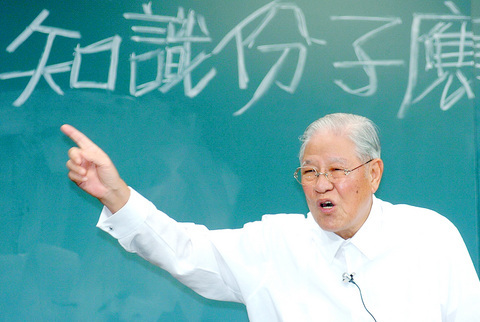Former president Lee Teng-hui (李登輝) yesterday said the most serious problem the government needs to tackle is people's confusion over national identity. Without establishing a consensus that leads Taiwan toward independence, the country will be lost to China, he said.
Lee said the Democratic Progressive Party (DPP) government had failed to maintain the strong and united Taiwanese identity that was established during the 228 hand-in-hand rally last year.
He also heaped blame on the pan-blue camp.

PHOTO: LIAO CHEN-HUI, TAIPEI TIMES
He said that Chinese Nationalist Party (KMT) Chairman Ma Ying-jeou's (
"Ma's Taiwan discourse is nothing but a lie to win more votes in the 2008 presidential election. It is clear that his ultimate goal is to unite with China, and the pan-blue camp's attempt to veto the arms procurement package is a product of this mindset," Lee said.
Lee made the comments yesterday in a lecture at a forum held by the Northern Society.
Lee said three major problems were leading to what he called a "drifting of thoughts," or confusion and changeable feelings about national identity. In addition to the lack of a consensus on national identity, Lee said that growing economic dependence on the Chinese market and Beijing's attempts to spread its way of thinking to Taiwan's young people by encouraging them to study in China are pushing Taiwan away from the "correct path."
Lee also said the recent export of Taiwan's fruit and agricultural products to China will mean the nation's prized agricultural technology will eventually be exported to China.
When asked how to oversee the DPP government, so that people's "drifting of thoughts" will not worsen, Lee said that the key was for the public to speak with unity.
"Everybody should hang together and propose the ideas we talked about today to the government. If the government chooses to ignore people's voices, then do not vote for it," Lee said.

Taiwan yesterday denied Chinese allegations that its military was behind a cyberattack on a technology company in Guangzhou, after city authorities issued warrants for 20 suspects. The Guangzhou Municipal Public Security Bureau earlier yesterday issued warrants for 20 people it identified as members of the Information, Communications and Electronic Force Command (ICEFCOM). The bureau alleged they were behind a May 20 cyberattack targeting the backend system of a self-service facility at the company. “ICEFCOM, under Taiwan’s ruling Democratic Progressive Party, directed the illegal attack,” the warrant says. The bureau placed a bounty of 10,000 yuan (US$1,392) on each of the 20 people named in

The High Court yesterday found a New Taipei City woman guilty of charges related to helping Beijing secure surrender agreements from military service members. Lee Huei-hsin (李慧馨) was sentenced to six years and eight months in prison for breaching the National Security Act (國家安全法), making illegal compacts with government employees and bribery, the court said. The verdict is final. Lee, the manager of a temple in the city’s Lujhou District (蘆洲), was accused of arranging for eight service members to make surrender pledges to the Chinese People’s Liberation Army in exchange for money, the court said. The pledges, which required them to provide identification

Nine retired generals from Taiwan, Japan and the US have been invited to participate in a tabletop exercise hosted by the Taipei School of Economics and Political Science Foundation tomorrow and Wednesday that simulates a potential Chinese invasion of Taiwan in 2030, the foundation said yesterday. The five retired Taiwanese generals would include retired admiral Lee Hsi-min (李喜明), joined by retired US Navy admiral Michael Mullen and former chief of staff of the Japan Self-Defense Forces general Shigeru Iwasaki, it said. The simulation aims to offer strategic insights into regional security and peace in the Taiwan Strait, it added. Foundation chair Huang Huang-hsiung

’DISTORTION’: Beijing’s assertion that the US agreed with its position on Taiwan is a recurring tactic it uses to falsely reinforce its sovereignty claims, MOFA said The Ministry of Foreign Affairs (MOFA) yesterday said Chinese state media deliberately distorted Taiwan’s sovereign status, following reports that US President Donald Trump agreed to uphold the “one China” policy in a phone call with Chinese President Xi Jinping (習近平). During the more than one-hour-long call, Xi urged Trump to retreat from trade measures that roiled the global economy and cautioned him against threatening steps on Taiwan, a Chinese government summary of the call said. China’s official Xinhua news agency quoted Xi as saying that the US should handle the Taiwan issue cautiously and avoid the two countries being drawn into dangerous